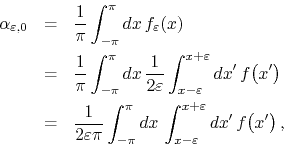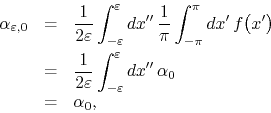Next: Action on the Fourier Up: Appendix: Properties of the Previous: Periodicity of Filtered Functions
Let us determine the effect of the filter on the Fourier coefficient
![]() . We start with the coefficient of
. We start with the coefficient of ![]() , which is given by
, which is given by
where we arbitrarily chose ![]() as the periodic interval. The
Fourier coefficient
as the periodic interval. The
Fourier coefficient
![]() of
of
![]() is
similarly given by
is
similarly given by

where we used the definition of
![]() in terms of
in terms of ![]() .
We now make the change of variables
.
We now make the change of variables ![]() on the inner integral,
implying
on the inner integral,
implying ![]() and
and ![]() , leading to
, leading to

Since the integral on ![]() is over the whole period, we may now change
variables on it without changing the integration limits, using
is over the whole period, we may now change
variables on it without changing the integration limits, using ![]() ,
with
,
with ![]() and
and ![]() , and thus obtaining
, and thus obtaining

were we recognized the form of ![]() . In this way we show that
. In this way we show that
![]() , that is, the filter does not change
, that is, the filter does not change
![]() at all. Another way to state this is to say that the filter
does not change the average value of
at all. Another way to state this is to say that the filter
does not change the average value of ![]() over the periodic interval.
over the periodic interval.